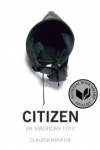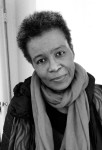The fifth nominated work for the National Book Critics Circle Award for poetry is Citizen: An American Lyric by Claudia Rankine. It is as different from the other nominated works as they are from themselves.

The poems of Citizen are not easy poems to read. Here’s an example (quotations added for clarity):
“At the end of a brief phone conversation, you tell the manager you are speaking with that you will come by his office to sign the form. When you arrive and announce yourself, he blurts out, I didn’t know you were black!
I didn’t mean to say that, he then says.
Aloud, you say.
What? he asks.
You didn’t mean to say that aloud.
Your transaction goes swiftly after that.”

Anger lives in the poems. And it is a righteous anger.
The poems include scenes of childhood, the aftermath of Hurricane Katrina, the career of Serena Williams, the unthinking statements of everyday social interaction. The more you read, the more you understand that these are memories and recollections, yes, but they are not in the past. These are memories that live in the present. This short prose poem explains that (quotations added for clarity):
“The world is wrong. You can’t put the past behind you. It’s buried in you; it’s turned your flesh into its own cupboard. Not everything remembered is useful but it all comes from the world to be stored in you. Who did what to whom on which day? Who said that? She said what? What did he just do? Did she really say that? He said what? What did she do? Did I hear what I think I heard? Did that just come out of my mouth, his mouth, your mouth? Do you remember when you sighed?”
These poems startle and confront, from the very first line. They challenge ways of being, thought, interactions between people. And what all of this means in the context of skin color.
You don’t read poetry like Rankine’s and remain unchanged.
Related: Three readings from Citizen by Claudia Rankine
We’ve been discussing the poetry collections nominated for the National Book Critics Circle Award for poetry. First, we covered Jake Adam York’s Abide; then we discussed Christian Wiman’s Once in the West. Last week, we looked at Willie Perdomo’s The Essential Hits of Shorty Bon Bon and Saeed Jones’ Prelude to Bruise. The winner will be announced this Thursday, March 12.
Photo by ThomasHawk, Creative Commons, via Flickr. Post by Glynn Young, author of the novels Dancing Priest and A Light Shining, and Poetry at Work.
Want to brighten your morning coffee?
Subscribe to Every Day Poems and find some beauty in your inbox.
- Poets and Poems: Alison Blevins and “Where Will We Live if the House Burns Down?” - July 1, 2025
- Poets and Poems: Paul Pastor and “The Locust Years” - June 26, 2025
- What Happened to the Fireside Poets? - June 24, 2025

Donna Z Falcone says
Oh, Glynn… this is a must read. I am going to order it. Thank you so much for this review.
Will Willingham says
I don’t often say things like this, but I thought while reading this collection that it ought to be required reading in HS English. Or history. Or civics. Heck, even math class. There ought to be a place to require that this be read.
Thanks for writing about it here, Glynn.
Donna Z Falcone says
I almost typed those exact words on facebook…. the only reason I didn’t is because I haven’t read it yet. But I’m ordering it today. Then I will, I’m sure.
Donna Z Falcone says
I just requested that our community library purchase the print and ebook versions of Citizen and provided a link to this reveiw for their information.
Maureen Doallas says
Rankine’s ‘Citizen’ is a gutsy, beautifully written collection that shows the extent to which this country remains racist, both subtly and not. The prose form sets it apart from much of what we accept as poetry, as does its incredibly cinematic quality. Rankine has, in effect, written scripts, and when you see these scripts take on life, as they do in some of the videos made of them (search them out, they are well worth seeing but especially hearing), they have enormous effect.
The piece involving the white tennis player left me disgusted and angry. The player should have been removed from competitions.
I completely accord with Will’s view that this book should be required HS reading, but not just in English classes. It probably won’t be, given the many people in this country who still refuse to acknowledge the racism that exists and their own racist leanings.
‘Citizen’ could not be more timely. I consider it one of the most important books to have been written in the last several years.
Glynn says
I’ve added three links to the article — three different readings from “Citizen” by the poet. I went looking for an audio book version but it does not appear to be available.
Donna Z Falcone says
Thank you Glynn. Listening to her read – I feel so many feelings but rising above them all is shame… and I want to hide my skin… because it hurts to hear these stories happening still and to wonder what I can do. Nothing new. Like she says you can’t really leave the past behind – I think of Rupert and how he tried – how he walked it off all those miles and then never told his wife about not being the guy but there’s only one guy. He never told her – but he couldn’t not leave it behind, either. I’m glad she wrote this book, and I’m so glad you’ve shared it with us here. Thank you.
Maureen Doallas says
At PBS, the video of “Stop and Frisk”, by Rankine and her husband, filmmaker John Lucas, is still able to be viewed.
Go here:
http://www.pbs.org/newshour/poetry/poet-claudia-rankine-on-the-violent-deaths-of-black-men/
There’s also good interviews with her at Bomb Magazine, Guernica, and Studio360 (with audio).
Donna Z Falcone says
I’m so surprised! Our community library is ordering this book and will notify me when it’s in. They were really happy for the suggestion. 🙂
Bethany R. says
Thank you for writing this piece, Glynn. I appreciate getting to expand my understanding of people and of words a little more each week here.
Vicki Addesso says
A startling read…
compelling…
I keep returning to Citizen, and am always surprised, moved, enraged, enlightened in new ways…